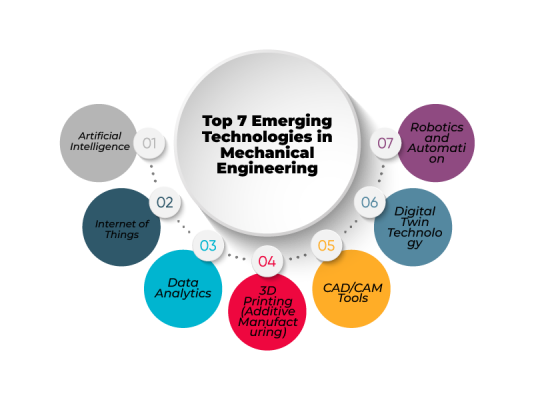Mechanical Engineering Courses: Future Trends, Technologies, & Job Market

Blog / June 21, 2025
mechanical engineering coursesEmerging Technologies in Mechanical EngineeringWhen it comes to mechanical engineering, you might picture engines, machines, and robotics. But now mechanical engineering is not what it used to be before.
It was once focused mainly on engines and heavy machinery, today mechanical engineering is at the intersection of innovation, sustainability, and smart technology. Mechanical engineers now develop smart systems with AI and have an important role in other industries.
As we step into 2025, Mechanical Engineering courses have adapted to this transformation. For students looking to stay ahead, understanding the new directions of this field is important. In this blog, we’ll explore the future of mechanical engineering education, cutting-edge technologies, and the job market for the next generation of engineers.

Mechanical Engineering Courses in 2025: A Snapshot
Mechanical engineering isn’t just about traditional mechanics anymore. Universities are redesigning their Mechanical Engineering courses to match the demands of Industry 4.0, and the emerging Industry 5.0. This means the curriculum now integrates smart technologies, automation, and sustainability.
You’ll often find specialized tracks such as:
- Robotics and Automation: It designs intelligent machines that can work alongside humans.
- Mechatronics: It blends mechanics, electronics, and computing for smarter devices.
- Thermal Systems and Energy Engineering: It focuses on efficient energy use, and alternative energy sources.
- AI Integration in Mechanical Systems: It uses artificial intelligence to optimize mechanical operations.
These areas prepare students not just to work with existing technology but to innovate future solutions.
Emerging Technologies Reshaping Mechanical Engineering
Technological advances have revolutionized how mechanical engineers design, and manufacture. Here’s what’s changing the game:
|
Technology |
How its Changing the Game of Future Engineers |
|
Artificial Intelligence |
AI helps engineers build smarter machines. For example, predictive maintenance in manufacturing cuts downtime, and cost. |
|
Internet of Things |
Mechanical systems now “talk” to each other. IoT allows connected machines to monitor themselves, and send alerts before something breaks. |
|
Data Analytics |
Students in B.Tech. Mechanical Engineering now learn how to read system data, and improve performance using real-time insights. |
|
3D Printing (Additive Manufacturing) |
Engineers can now print lightweight, complex parts—faster, and cheaper than before. It’s already transforming industries such as automotive and aerospace. |
|
CAD/CAM Tools |
Modern software helps you design, simulate, and manufacture with high precision. It saves both time and material. |
|
Digital Twin Technology |
Imagine testing a virtual version of a car before you build it. Digital twins make this possible, and are widely used in advanced manufacturing. |
|
Robotics and Automation |
Robots handle repetitive tasks in industries, and mechanical engineers design, and maintain them—especially in smart factories. |
Together, these technologies reshape not only what engineers build but also how they learn, and work.
Top Mechanical Engineering Courses
B.Tech. Mechanical Engineering
B.Tech. Mechanical Engineering is a four-year undergraduate course that involves the manufacturing, operational, and design aspect of machines, and devices. Moreover, it gives insight into the production, and design industry, nurtures analytical reasoning skills, and imparts fundamental skills about how to treat machines, and their inherent problems.
B.E. in Mechanical Engineering
A B.E. in mechanical engineering is a four-year undergraduate program that concentrates on the design, analysis, manufacturing, and operation of mechanical systems, and components. This program is focused on meeting the needs of the market, problem solving, and designing for the future.
M.Tech. Mechanical Engineering
An M.Tech. in Mechanical Engineering is a two-year graduate course in which students learn basic principles of concepts, including thermodynamics, machine design, state of matter, principles, and applications of machines. This mechanical engineering course provides valuable insight into the machine world, and is a mix of theory, and practice to inform the students for the challenges they will face in the working world.
M.Sc. in Mechanical Engineering
An M.Sc. in Mechanical Engineering is a two-year postgraduate program. It is designed to provide advanced training, and specialization in various aspects of mechanical engineering such as design, analysis, and manufacturing.
Ph.D. Mechanical Engineering
Ph.D. in Mechanical Engineering is a two- to five-year research-based doctoral-level course where individuals get to learn about various mechanical engineering skills. Further, there are many job options available after completing Ph.D. in Mechanical Engineering such as Lecturer, Junior Engineer, Executive Engineer, Assistant Engineer, and others.
If you’re stepping into engineering right after school, B.Tech. Mechanical Engineering offers a solid start. It lays the groundwork for every specialized or research-focused role that follows. Let’s break down what the B.Tech. program really offers in today’s fast-evolving world.
B.Tech. Mechanical Engineering: Course Overview
An undergraduate degree that builds core mechanical concepts along with exposure to emerging technologies like automation, robotics, and sustainability.
Course Highlight
|
Aspects |
Details |
|
Course Level |
Undergraduate Degree |
|
Full Form |
Bachelor of Technology in Mechanical Engineering |
|
Duration |
4 Years (8 Semesters) |
|
Examination Type |
Semester-wise |
|
Eligibility Requirements |
Passed 12th grade (science stream with Physics, Chemistry, Maths) with aggregate marks of 60-70% |
|
Average Tuition Fees |
Average up to 4 Lakhs |
|
Entrance Exams |
JEE Mains, or JEE Advanced |
|
Focus |
Covers a wide foundation combined with hands-on projects, and internships. |
|
Career Path |
Entry-level engineering roles |
B.Tech. Mechanical Engineering Course Syllabus
Here is the semester-wise syllabus for B.Tech. Mechanical Engineering:
First Semester
- Maths
- Physics
- Manufacturing Process
- Descriptive Engineering Drawing and
- Engineering Mechanics: Statics and Dynamics
Second Semester
- Introduction to Computing and Programming
- Introduction to Electrical Engineering
- Maths and
- Physics
Third Semester
- Maths
- Materials Science and Engineering
- Mechanics of Solids
- Manufacturing Sciences and
- Mechanics of Fluids
Fourth Semester
- Kinematics and Dynamics of Machines
- Engineering Thermodynamics
- Mechanical Engineering Design & Graphics
- Principles of Industrial Engineering and
- Computer-Aided Design and Manufacturing
Fifth Semester
- Applied Thermodynamics
- Heat and Mass Transfer
- Operations Research
- Machine Design and
- Mechatronics & Control System
Sixth Semester
- Refrigeration & Air Conditioning
- Fluid Machinery
- I.C. Engines & Automobiles and
- Major Elective – I
Seventh Semester
- Major Elective – II
- Major Elective – III
- UWE–VI and
- Project-1
Eighth Semester
- Project
Skills Mechanical Engineering Students Need in 2025
The job market demands more than technical knowledge. Here are the skills you required:
- Technical Skills: Proficiency in CAD software, MATLAB, ANSYS, and programming languages like Python.
- Analytical Thinking: Ability to solve complex problems efficiently.
- Automation & Robotics Knowledge: Understanding control systems, and sensors.
- Communication: Clear articulation of ideas in teams, and reports.
- Adaptability: Keeping up with fast-evolving technologies.
Developing these will give you an edge in an increasingly competitive field.
Global & Indian Job Market for Mechanical Engineers
Mechanical engineering has been an important part of industry innovation. In 2025, it is becoming more important to the workforce. Mechanical engineers are in-demand across all industries, as it is important to understand the human, and environmental costs when industry goes smart, automated, and green.
Recent reports state that mechanical engineering is expected to have a 9% growth demand for mechanical engineers from 2016-2026. It is positive that engineering follows steady growth, even in times of transition, and transformation.
Let’s see what the marketplace has in-store for future engineers!
Fastest Growing Areas for Mechanical Engineering:
- Aerospace - It designs aircraft, and spacecraft.
- Electric Vehicles (EV) - It develops efficient powertrains, and batteries.
- Smart Manufacturing - It integrates robotics, and IoT on factory floors.
- Healthcare Technology - It works on prosthetics, and medical devices.
Key Job Roles Emerging are:
- Product Designer
- R&D Engineer
- Maintenance Engineer
- Robotics Engineer and
- Thermal Analyst
Your Path to Mechanical Engineering Starts at Shiv Nadar University (Institution of Eminence)
If you aim to build a strong future in mechanical engineering, the School of Engineering at Shiv Nadar University offers more than just a degree- it offers direction.
The B.Tech. program at Shiv Nadar University blends core mechanical principles with hands-on exposure to robotics, smart manufacturing, and AI integration—skills that matter in today's fast-changing industry.
Why Choose Shiv Nadar University for Mechanical Engineering?
Here’s what sets it apart:
- Industry-Ready Curriculum
- Hands-on Learning with Real-World Exposure
- Research-Driven Environment
- Interdisciplinary Learning
- Global & Industry Connect and
- Career Support & Placement
Apply now for B.Tech. Mechanical Engineering at Shiv Nadar University, and get ready to design, build, and lead the innovations of tomorrow.
Conclusion
Mechanical engineering programs are evolving continuously. It combines the new technology with traditional strengths to address the problems of the future. Whether you are an emerging mechanical engineering student or considering a higher education, staying updated on trends and developing various skills will future-proof your career.
So if you are interested to turn your curiosity into creation and purpose into passion, consider Mechanical Engineering courses at a university. If you join Shiv Nadar University, then you can move forward confidently and shape the future in mechanical engineering.
FAQs
- What are the emerging technologies in mechanical engineering?
AI, IoT, 3D printing, digital twins, and smart materials are key emerging areas.
- Is mechanical engineering still a good career in 2025?
Yes, it's evolving rapidly. With demand growing in smart manufacturing, and green tech, the career scope remains strong, and future-ready.
- Do mechanical engineering courses now include AI, and robotics?
Yes, most updated programs offer modules on AI, IoT, automation, and 3D printing to match industry trends.